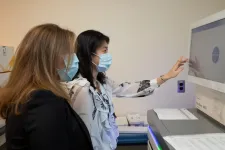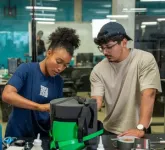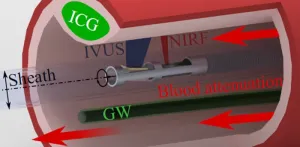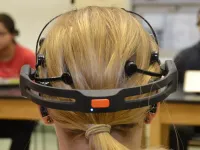(Press-News.org) A new clinical RNA sequencing platform at The Hospital for Sick Children (SickKids) is helping to facilitate research into rare genetic conditions and carve a path for Precision Child Health, a movement at SickKids to deliver individualized care for every patient.
RNA sequencing provides a different way of looking at the genes, by looking at how the body interprets the genetic code rather than looking directly at the genetic code itself. While DNA-based tests like genome sequencing take a picture of a person’s genetic code, scientists can better understand how the DNA is being read by also looking at RNA, which carries instructions for making proteins in our body.
Across the SickKids Research Institute, scientists have been working closely together over the last six years to build and incorporate RNA sequencing into the research pipeline. Now, championed by Dr. Lianna Kyriakopoulou, a Clinical Laboratory Director in the Division of Genome Diagnostics, and Laboratory Specialist Dr. Kyoko Yuki, this technology is, for the first time in Canada, validated to be used in the clinical space as a new tool for precision diagnostics.
“The clinical RNA sequencing platform at SickKids is helping to move the needle in achieving a diagnosis for patients with rare genetic conditions through patient-centred care, or what SickKids calls Precision Child Health,” says Dr. Lianna Kyriakopoulou. “Used together, genome sequencing and RNA sequencing can potentially further inform which findings are relevant to help guide clinical decision-making.”
Combined DNA and RNA sequencing offers improved diagnostic information for complex genetic conditions
Using this clinical RNA sequencing platform, a team of SickKids researchers, in collaboration with Dr. Panagiota Klentrou at Brock University, performed genome sequencing and RNA sequencing on 97 individuals from 39 different families in the Complex Care Program, a clinical program focused on diagnosis and care of children with unexplained medical complexity.
In a study published in the American Journal of Human Genetics, the RNA analysis provided useful diagnostic information for an additional eight per cent of the patients whose diagnosis was not confirmed using genome sequencing alone, either confirming or ruling out the impact of a DNA variant identified during genome sequencing.
“Our findings demonstrate a clear benefit to pairing RNA sequencing with genome sequencing in a cohort of children who are suspected to have a genetic diagnosis,” explains co-first author Dr. Ashish Deshwar, a resident physician in Medical Genetics & Genomics.
This study is also one of the first to examine the utility of a trio-approach to RNA sequencing, a process which involves conducting RNA sequencing on the affected individual and both parents. While trio RNA sequencing with this population did not uncover any new genetic variants, it decreased the amount of time researchers needed to spend reviewing results and made the analysis more efficient.
Deshwar, alongside other first-authors Yuki and Dr. Huayun Hou, a Bioinformatician in the Wilson Lab, also noticed inherited RNA patterns between family members and are optimistic about its potential use in further research.
“We hope that the results of our study will help support the inclusion of clinical based RNA-testing in diagnostic workflows for children with rare conditions,” say co-leads and physician-scientists Drs. Gregory Costain and Jim Dowling, Scientist-Track Investigator and Senior Scientist (respectively) in the Genetics & Genome Biology program.
RNA sequencing platform sparks new research into genetic conditions
The study is just one of the many research programs harnessing RNA sequencing at SickKids.
At The Centre for Applied Genomics (TCAG) in the SickKids Research Institute, automated screening platforms are also available to researchers thanks to a collaborative effort including the Wilson Lab, Dowling Lab, Costain Lab, Shlien Lab, Brudno Lab, and others as well as the equipment and expertise at The Centre for Computational Medicine (CCM).
Current research already underway includes the study of allergic responses with Dr. Thomas Eiwegger and blood samples from individuals with lupus with Dr. Linda Hiraki.
Bridging clinical and research for the future of Precision Child Health
As more research is done into the benefits of RNA sequencing, scientists and clinicians are excited to better define the scenarios where clinical RNA sequencing can provide real insights for patients with rare genetic conditions, as well as other patient groups. This will be essential to providing the evidence needed to inform decisions about making RNA sequencing more broadly available for precision diagnostics.
“We have built a strong bridge between the research and clinical labs at SickKids which will benefit ongoing and future studies contributing to precision medicine becoming standard of care, as well as patients throughout the hospital,” says Dr. Michael Wilson, a Senior Scientist in the Genetics & Genome Biology program, who previously held a Canada Research Chair in Comparative Genomics. “By carefully sequencing and analysing RNA from diverse populations of sick and healthy children we have the potential to improve how we find diagnoses for patients with rare genetic conditions.”
This research was funded by Genome Canada, SickKids Centre for Genetic Medicine, SickKids Research Institute and the University of Toronto McLaughlin Centre. Additional funding for the development of the RNA sequencing platform was provided by SickKids Innovators Fund.
END
First-in-Canada clinical RNA sequencing platform may improve rare disease diagnostics in pediatrics
A clinical RNA sequencing platform at SickKids, the first of its kind in Canada, offers insights into complex genetic conditions and the future of precision diagnostics
2023-04-13
ELSE PRESS RELEASES FROM THIS DATE:
Durability of bivalent boosters against Omicron subvariants
2023-04-13
(CHAPEL HILL, N.C., April 13, 2023) New research led by the UNC Gillings School of Global Public Health shows that bivalent COVID-19 boosters are still providing effective protection from hospitalization and death, even against the most recent omicron subvariants.
Published this week in the New England Journal of Medicine (NEJM), researchers found that the bivalent boosters were 67% effective in preventing hospitalization and death in those who had been previously vaccinated or boosted. Effectiveness waned to 48% after four weeks, 44% after 10 weeks and 38% after 20 weeks.
Though ...
Improving the accuracy of near-infrared fluorescence in cardiovascular imaging
2023-04-13
Cardiovascular diseases (CVDs) or heart diseases are still the leading cause of death globally. Fortunately, doctors are now equipped with more advanced and sophisticated tools that help them diagnose CVDs. A prominent example is intravascular ultrasound (IVUS), which enables cardiologists to obtain images of the inside of blood vessels using a thin ultrasound probe. These images can then be used to assess problems such as the thickening of arteries caused by fat or plaque buildup.
While IVUS is undoubtedly a powerful ...
New tool to study hepatitis B could open the door to a cure
2023-04-13
Hepatitis C and hepatitis B viruses both attack the liver, eventually causing deadly cirrhosis or cancer. But while antivirals can cure 95 percent of HCV infections, its cousin HBV has long eluded effective therapeutics. As a result, nearly 1 million people die from HBV every year.
Now researchers from the lab of Rockefeller’s Charles M. Rice—who shared the 2020 Nobel Prize in Physiology or Medicine for pioneering novel methods to grow and study HCV—have developed an approach for studying HBV in the lab that ...
Biological bouncers: How immune cells yank antigens from surfaces to learn and evolve
2023-04-13
Most cells evolve slowly, accumulating incremental changes that better suit their environments. Immune cells, because they must adapt rapidly to counter new threats, evolve much more quickly. Part of that, UCLA physicists now report, rests on their ability to forcibly pull antigens off other cells’ surfaces and “study” them.
By using this type of mechanical force, the immune system’s B cells, which create antibodies that fight off harmful pathogens like viruses, bacteria and parasites by targeting their ...
OHSU researchers assemble comprehensive atlas of gene mutations in human tissue
2023-04-13
Researchers have created the largest atlas of post-zygotic genome mutations in healthy human tissue ever assembled — a scientific advancement that could unlock new avenues for diagnosing and treating genetic disease. It is the largest ever in terms of the combined number of tissues and number of donors sampled.
The study, led by researchers at Oregon Health & Science University, published today in the journal Science.
The development points the way toward understanding the genetic underpinnings of disease associated with cancer as well as innumerable conditions caused by cellular malfunction, including ...
In sync brainwaves predict learning, study shows
2023-04-13
Students whose brainwaves are more in sync with their classmates and teacher are likely to learn better than those lacking this “brain-to-brain synchrony,” shows a new study by a team of psychology and education researchers. The findings, which appear in the journal Psychological Science, offer new insights into the learning process.
“This is the first study to show that the extent to which students’ and teachers’ brainwaves are in sync during real-world learning can predict how well students retain information from class,” says lead author Ido Davidesco, an assistant professor at the ...
Researchers discover tiny galaxy with big star power using James Webb telescope
2023-04-13
Using first-of-their-kind observations from the James Webb Space Telescope, a University of Minnesota Twin Cities-led team looked more than 13 billion years into the past to discover a unique, minuscule galaxy that generated new stars at an extremely high rate for its size. The galaxy is one of the smallest ever discovered at this distance—around 500 million years after the Big Bang—and could help astronomers learn more about galaxies that were present shortly after the Universe came into existence.
The paper is published in Science, one of the world's top peer-reviewed academic journals.
The University of Minnesota researchers were one of the first teams to study ...
Humans, and piglets, and bears, oh my! Preventing dangerous blood clots
2023-04-13
“Don’t poke the bear”, they said. But that’s exactly what a team of scientists have been doing, to discover the secrets of blood clotting.
Hibernating bears, paralysed humans, and pigs kept in small enclosures all avoid dangerous blood clots, despite being immobile for extremely long periods.
Research from the University of Reading, with partners in Denmark, Germany, Norway and Sweden, shows that reduction of a key protein prevents the formation of blood clots in all three mammal species when they ...
UTSA astrophysicist leads international team in discovery of new exoplanet outside Earth’s solar system
2023-04-13
(SAN ANTONIO) April 13, 2023 - An international research team led by UTSA Associate Professor of Astrophysics Thayne Currie has made a breakthrough in accelerating the search for new planets.
In a paper slated for publication April 14 in Science, Currie reports the first exoplanet jointly discovered through direct imaging and precision astrometry, a new indirect method that identifies a planet by measuring the position of the star it orbits. Data from the Subaru Telescope in Hawai`i and space telescopes from the European Space Agency (ESA) were integral to the team’s discovery.
An ...
Shift to ‘flash droughts’ as climate warms
2023-04-13
Embargoed: Not for Release Until 19:00 (7.00 pm) British Summer Time, Thursday, 13 April 2023
Shift to ‘flash droughts’ as climate warms
‘Flash droughts’ have become more frequent due to human-caused climate change and this trend is predicted to accelerate in a warmer future, according to research published today [13 April 2023] involving the University of Southampton.
The research published in Science shows that flash droughts, which start and develop rapidly, are becoming ‘the new normal’ for droughts, making forecasting and preparing for their impact more difficult.
Flash ...
LAST 30 PRESS RELEASES:
Why chronic pain lasts longer in women: Immune cells offer clues
Toxic exposure creates epigenetic disease risk over 20 generations
More time spent on social media linked to steroid use intentions among boys and men
New study suggests a “kick it while it’s down” approach to cancer treatment could improve cure rates
Milken Institute, Ann Theodore Foundation launch new grant to support clinical trial for potential sarcoidosis treatment
New strategies boost effectiveness of CAR-NK therapy against cancer
Study: Adolescent cannabis use linked to doubling risk of psychotic and bipolar disorders
Invisible harms: drug-related deaths spike after hurricanes and tropical storms
Adolescent cannabis use and risk of psychotic, bipolar, depressive, and anxiety disorders
Anxiety, depression, and care barriers in adults with intellectual and developmental disabilities
Study: Anxiety, gloom often accompany intellectual deficits
Massage Therapy Foundation awards $300,000 research grant to the University of Denver
Gastrointestinal toxicity linked to targeted cancer therapies in the United States
Countdown to the Bial Award in Biomedicine 2025
Blood marker from dementia research could help track aging across the animal world
Birds change altitude to survive epic journeys across deserts and seas
Here's why you need a backup for the map on your phone
ACS Central Science | Researchers from Insilico Medicine and Lilly publish foundational vision for fully autonomous “Prompt-to-Drug” pharmaceutical R&D
Increasing the number of coronary interventions in patients with acute myocardial infarction does not appear to reduce death rates
Tackling uplift resistance in tall infrastructures sustainably
Novel wireless origami-inspired smart cushioning device for safer logistics
Hidden genetic mismatch, which triples the risk of a life-threatening immune attack after cord blood transplantation
Physical function is a crucial predictor of survival after heart failure
Striking genomic architecture discovered in embryonic reproductive cells before they start developing into sperm and eggs
Screening improves early detection of colorectal cancer
New data on spontaneous coronary artery dissection (SCAD) – a common cause of heart attacks in younger women
How root growth is stimulated by nitrate: Researchers decipher signalling chain
Scientists reveal our best- and worst-case scenarios for a warming Antarctica
Cleaner fish show intelligence typical of mammals
AABNet and partners launch landmark guide on the conservation of African livestock genetic resources and sustainable breeding strategies
[Press-News.org] First-in-Canada clinical RNA sequencing platform may improve rare disease diagnostics in pediatricsA clinical RNA sequencing platform at SickKids, the first of its kind in Canada, offers insights into complex genetic conditions and the future of precision diagnostics







